初中英语语法基础时态专题讲解课件(43张PPT)
文档属性
| 名称 | 初中英语语法基础时态专题讲解课件(43张PPT) |

|
|
| 格式 | zip | ||
| 文件大小 | 3.1MB | ||
| 资源类型 | 教案 | ||
| 版本资源 | 通用版 | ||
| 科目 | 英语 | ||
| 更新时间 | 2020-07-22 00:00:00 | ||
图片预览

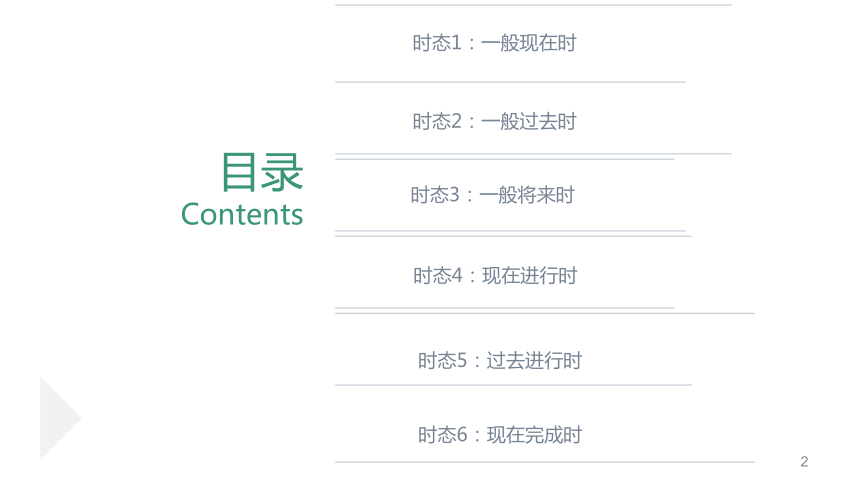

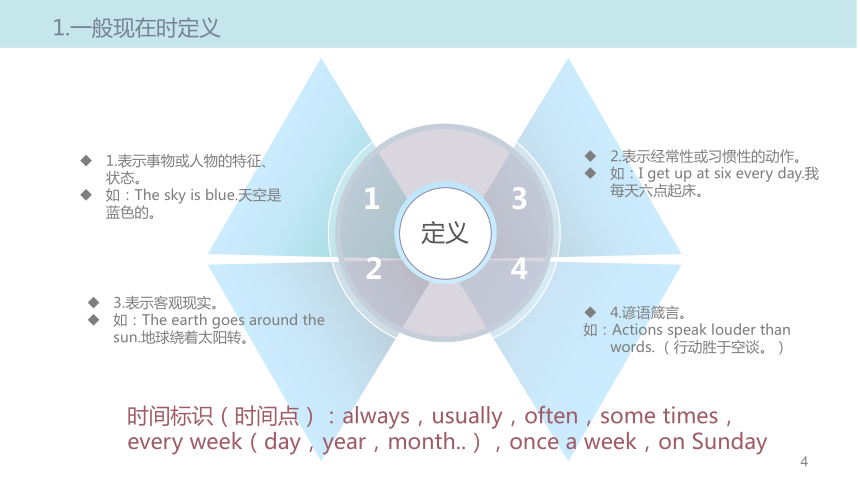
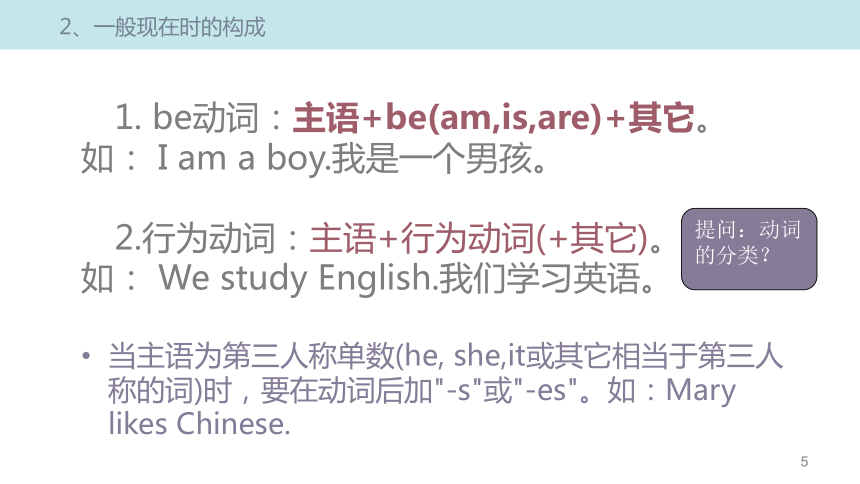
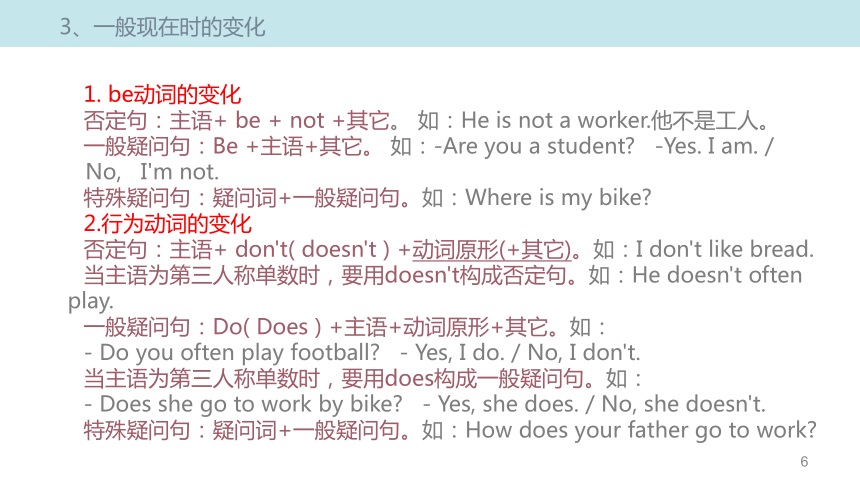
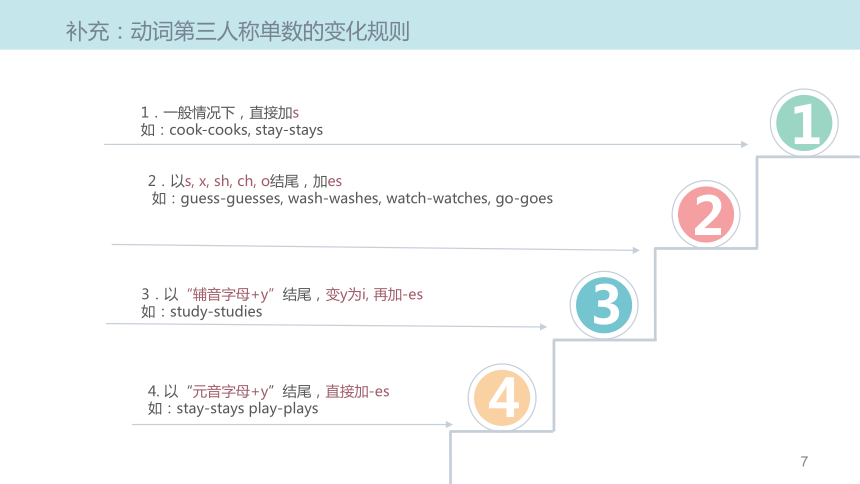
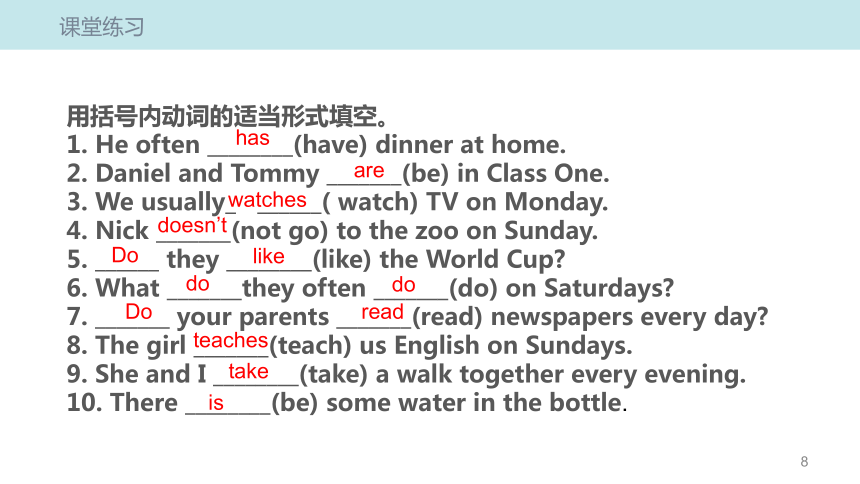

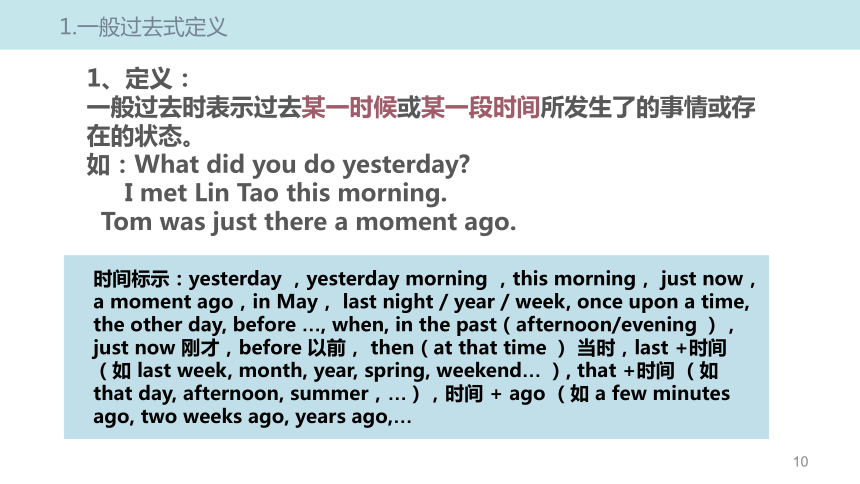
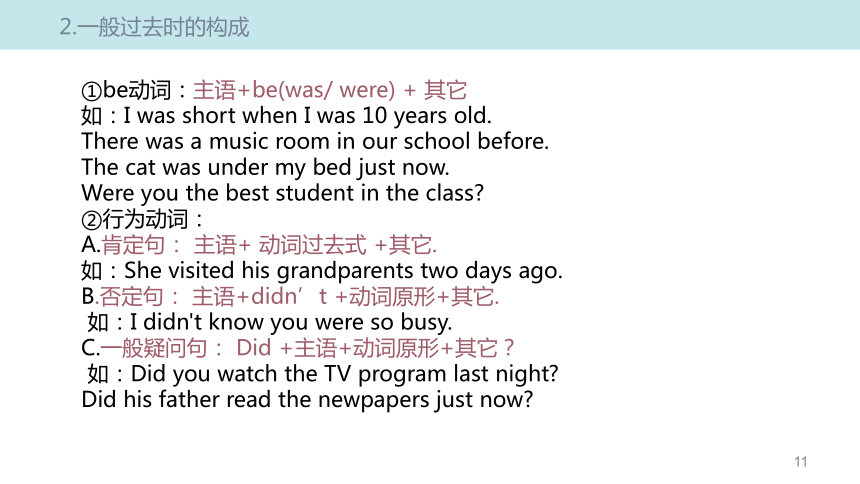
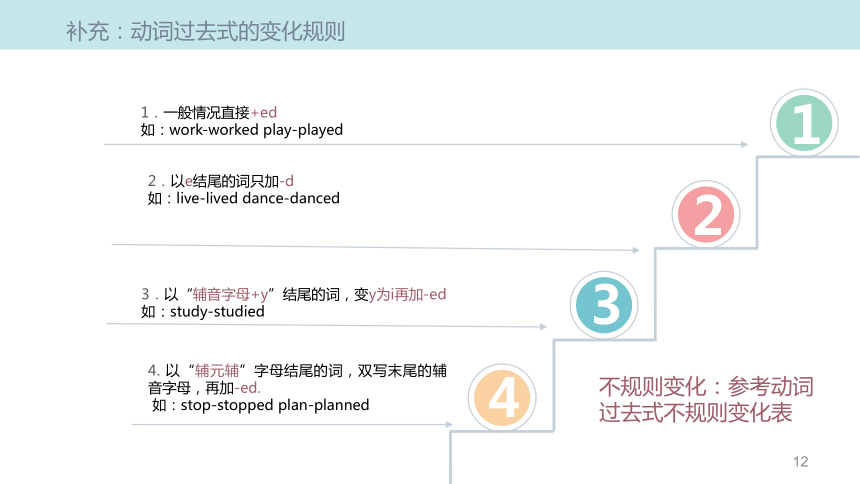
文档简介
(共43张PPT)
初中英语语法基础
时态专题讲解
时态1:一般现在时
时态2:一般过去时
时态3:一般将来时
时态4:现在进行时
目录
Contents
时态5:过去进行时
时态6:现在完成时
时态1:一般现在时
2.表示经常性或习惯性的动作。
如:I
get
up
at
six
every
day.我每天六点起床。
3.表示客观现实。
如:The
earth
goes
around
the
sun.地球绕着太阳转。
1.表示事物或人物的特征、状态。
如:The
sky
is
blue.天空是蓝色的。
1.一般现在时定义
4.谚语箴言。
如:Actions
speak
louder
than
words.
(行动胜于空谈。)
时间标识(时间点):always,usually,often,some
times,every
week(day,year,month..),once
a
week,on
Sunday
2、一般现在时的构成
1.
be动词:主语+be(am,is,are)+其它。
如:
I
am
a
boy.我是一个男孩。
2.行为动词:主语+行为动词(+其它)。
如:
We
study
English.我们学习英语。
当主语为第三人称单数(he,
she,it或其它相当于第三人称的词)时,要在动词后加"-s"或"-es"。如:Mary
likes
Chinese.
提问:动词的分类?
3、一般现在时的变化
1.
be动词的变化
否定句:主语+
be
+
not
+其它。
如:He
is
not
a
worker.他不是工人。
一般疑问句:Be
+主语+其它。
如:-Are
you
a
student?
-Yes.
I
am.
/
No,
I'm
not.
特殊疑问句:疑问词+一般疑问句。如:Where
is
my
bike?
2.行为动词的变化
否定句:主语+
don't(
doesn't
)
+动词原形(+其它)。如:I
don't
like
bread.
当主语为第三人称单数时,要用doesn't构成否定句。如:He
doesn't
often
play.
一般疑问句:Do(
Does
)
+主语+动词原形+其它。如:
-
Do
you
often
play
football?
-
Yes,
I
do.
/
No,
I
don't.
当主语为第三人称单数时,要用does构成一般疑问句。如:
-
Does
she
go
to
work
by
bike?
-
Yes,
she
does.
/
No,
she
doesn't.
特殊疑问句:疑问词+一般疑问句。如:How
does
your
father
go
to
work?
用括号内动词的适当形式填空。
1.
He
often
________(have)
dinner
at
home.
2.
Daniel
and
Tommy
_______(be)
in
Class
One.
3.
We
usually_
______(
watch)
TV
on
Monday.
4.
Nick
_______(not
go)
to
the
zoo
on
Sunday.
5.
______
they
________(like)
the
World
Cup?
6.
What
_______they
often
_______(do)
on
Saturdays?
7.
_______
your
parents
_______(read)
newspapers
every
day?
8.
The
girl
_______(teach)
us
English
on
Sundays.
9.
She
and
I
________(take)
a
walk
together
every
evening.
10.
There
________(be)
some
water
in
the
bottle.
课堂练习
has
are
watches
doesn’t
Do
like
do
do
Do
read
teaches
take
is
时态2:一般过去时
1.一般过去式定义
1、定义:
一般过去时表示过去某一时候或某一段时间所发生了的事情或存在的状态。
如:What
did
you
do
yesterday?
I
met
Lin
Tao
this
morning.
Tom
was
just
there
a
moment
ago.
时间标示:yesterday
,yesterday
morning
,this
morning,
just
now,
a
moment
ago,in
May,
last
night
/
year
/
week,
once
upon
a
time,
the
other
day,
before
…,
when,
in
the
past(afternoon/evening
),just
now
刚才,before
以前,
then(at
that
time
)
当时,last
+时间
(如
last
week,
month,
year,
spring,
weekend…
),
that
+时间
(如
that
day,
afternoon,
summer,…),时间
+
ago
(如
a
few
minutes
ago,
two
weeks
ago,
years
ago,…
2.一般过去时的构成
①be动词:主语+be(was/
were)
+
其它
如:I
was
short
when
I
was
10
years
old.
There
was
a
music
room
in
our
school
before.
The
cat
was
under
my
bed
just
now.
Were
you
the
best
student
in
the
class?
②行为动词:
A.肯定句:
主语+
动词过去式
+其它.
如:She
visited
his
grandparents
two
days
ago.
B.否定句:
主语+didn’t
+动词原形+其它.
如:I
didn't
know
you
were
so
busy.
C.一般疑问句:
Did
+主语+动词原形+其它?
如:Did
you
watch
the
TV
program
last
night?
Did
his
father
read
the
newpapers
just
now?
不规则变化:参考动词过去式不规则变化表
用动词的适当形式填空
用括号内动词的适当形式填空。
1.
Tom
and
Mary
________
(come)
to
China
last
month.
2.
Mike
_________(not
go)
to
bed
until
12
o'clock
last
night.So
he
______
(get)
up
late
today.
3.
Mary
________
(read)
English
yesterday
morning.
4.
Tom
________
(begin)
to
learn
Chinese
last
year.
5.
My
mother
________
(not
do)
housework
yesterday.
6.
There
_________
a
telephone
call
for
you
just
now.
(be)
7.
---When
_______
you
_______
(come)
to
china?
---Last
year.
8.
______
(be)
it
cold
in
your
city
yesterday?
9.
How
many
people
______
(be)
there
in
your
class
last
term?
10.
There
______
(be)
a
football
match
on
TV
yesterday
evening,
but
I
______
(have)
no
time
to
watch
it.
课堂练习
came
did’t
gets
read
began
came
came
came
came
Was
were
was
had
时态3:一般将来时
一般过去式定义
1、定义
一般将来时表示将来某个时间要发生的动作或存在的状态,常与表示将来的时间状语连用
时间标示:tomorrow,
next
week,
next
year
,
soon,
in
a
month等。
助动词will+动词原形
be
going
to
+
动词原形
be
to+动词原形
“be
+
V.ing”
be
about
to+动词原形
2.一般将来时的构成
2.一般将来时的构成——助动词will+动词原形
一般将来时由“助动词will+动词原形”构成。
在口语中,will在名词或代词后常缩写为'll
will
not简缩为won’t。
He
will
help
his
sister
with
her
lessons.
We
won't
be
free
this
afternoon.
Why
don’t
you
put
the
meat
in
the
fridge?
It
will
stay
fresh
for
several
days.
—You've
left
the
light
on.
(你忘了关灯了。)
—Oh
,
so
I
have.
I'll
go
and
turn
it
off.
(噢,那我马上去关。)
①
这种结构表示打算、计划、决定要做的事或肯定要发生的事。
What
are
you
going
to
do
next
Sunday?
下星期天你打算干什么?
They
are
going
to
meet
outside
the
school
gate.他们打算在校门口见面。
还可表示说话人根据已有的事实或迹象,认为某事即将发生、肯定会发生或可能出现的情况。
I
think
I'm
going
to
die.
我想我要死了。(现在生命垂危)
Look
at
the
cloud.
It’s
going
to
rain.(乌云密布,使我断定天要下雨)
。
这种结构表示“肯定、预测,注定会”。在这种情况下可以和“think,
hope,
want,
believe,
like”等表示动词连用。
He
failed
in
the
exam;
he
knew
he
was
going
to
when
he
looked
at
the
test
paper.他没考及格,他一看试卷就知道考不及格。
2.一般将来时的构成——be
going
to
+
动词原形
2.一般将来时的构成——be
+
V.ing表示将来
句中的现在进行时结构表示按计划、安排即将发生的动作,这一结构常用于表示位置转移的动词,如come
,
go
,
leave,
start
,move,
arrive等。
I'm
leaving
for
Tibet
on
Sunday.星期天我要去西藏。
When
are
you
going
back
to
your
factory?
你什么时候回工厂?
He
is
not
coming.他不来了。
They
are
arriving
tomorrow
afternoon.他们明天下午到达。
一般将来时的构成——“be
about
to+动词原形”
一般将来时的构成——“be
to+动词原形”
Have
you
ever
seen
the
scene
of
Los
Angeles
at
4am?
I
see
often,
because
I
have
been
starting
training
at
that
time.
课堂练习:
(
D
)
1.
The
day
after
tomorrow
they
________
a
volleyball
match.
A.
will
watching
B.
watches
C.
is
watching
D.
are
going
to
watch
(
B
)
2.
There
________
a
birthday
party
this
Sunday.
A.
shall
be
B.
will
be
C.
shall
going
to
be
D.
will
going
to
be
(
B)
3.
They
________
an
English
evening
next
Sunday.
A.
are
having
B.
are
going
to
have
C.
will
having
D.
is
going
to
have
(
B
)
4.
________
you
________
free
next
Sunday?
A.
Will;
are
B.
Will;
be
C.
Do;
be
D.
Are;
be
(
C
)
5.
He
________
there
at
ten
tomorrow
morning.
A.
will
B.
is
C.
will
be
D.
be
(
B
)
6.
________
your
brother
________
a
magazine
from
the
library?
A.
Are;
going
to
borrow
B.
Is;
going
to
borrow
C.
Will;
borrows
D.
Are;
going
to
borrows
(
D
)
7.
–
Where
is
the
morning
paper?
–
I
________
it
for
you
at
once.
A.
get
B.
am
getting
C.
to
get
D.
will
get
(
B
)
8.
________
a
concert
next
Saturday?
A.
There
will
be
B.
Will
there
be
C.
There
can
be
D.
There
are
(
B
)
9.
If
they
come,
we
________
a
meeting.
A.
have
B.
will
have
C.
had
D.
would
have
(
C
)10.
He
________
to
us
as
soon
as
he
gets
there.
A.
writes
B.
has
written
C.
will
write
D.
wrote
(
C
)11.
He
________
in
three
days.
A.
coming
back
B.
came
back
C.
will
come
back
D.
is
going
to
coming
back
(
D
)12.The
train
________
at
11.
A.
going
to
arrive
B.
will
be
arrive
C.
is
going
to
D.
is
arriving
时态4:现在进行时
1.现在进行时定义和构成
1.
定义:表示说话时(瞬间)正在进行的动作,也表示目前或现阶段一直进行的动作。
时间标示:now,at
this
time,these
days,etc.
2.
结构:
①肯定句:
主语
+
am/is/are
+
V-ing
②否定句:
主语
+
am/is/are
+
not
+
V-ing
③疑问句:
Am/Is/Are
+
主语
+
V-ing
④特殊疑问句:
特殊疑问词
+
am/is/are
+
主语
+
V-ing
(1)表示说话时正在进行的,目前正在发生的动作。
Look!
The
big
bird
is
flying
away.
He
is
watching
a
movie
now.
(2)表示目前一段时间内正在进行,但说话时可能没有进行的动作。
We
are
playing
football
these
days.
这些天我们在踢足球。
Recently,
I
am
studying
Chinese
by
distance
learning.
我最近正通过远程教育学习汉语。
。
(3)与always,
constantly,
forever,
all
the
time等副词连用,表示动作反复或习惯。此时句子常含有说话者的强烈情感在内。表达较强的“责备”或“表扬”之意
You
are
always
changing
your
mind.
你总是主意不定。(有不满、责备之意)
He
is
always
helping
others.
他总是帮助别人。(有欣赏、夸奖之意)
You
are
always
(forget)
the
important
thing.
你总是把重要的事情忘掉。
2.现在进行时用法
课堂练习:
(
B
)
1.Look!
The
boy
students
are
___
football
while
the
girls
are
________.
A.
playing,
dance
B.
playing,
dancing
C.
play,
dancing
D.
play,
dance
(
C
)
2.
Mr.
Smith
______
short
stories,
but
he
______
a
TV
play
these
days.
A.
is
writing,
is
writing
B.
is
writing,
writes
C.
writes,
is
writing
D.
writes,
writes
(
D
)
3.It’s
eight
o’clock.
The
students
___
an
English
class.
A.have
B.having
C.is
having
D.are
having
(
D
)
4.The
boy
isn't________
the
teacher
in
class.
A.listen
B.listens
C.listening
D.listening
to
时态5:过去进行时
1.过去进行时定义和构成
1.定义:过去进行时,是表示过去某个具体时刻正在进行的事情或动作。
时间标示:at
this
time
yesterday,at
that
time或以when引导的谓语动词是一般过去时的时间状语等。
2.
结构:was/were
+doing
(现在分词)
如:He
was
playing
table
tennis
at
five
yesterday
afternoon.
过去进行时用法
用法
时间标示
常用的时间状语:this
morning,
the
whole
morning,
all
day
yesterday,
from
nine
to
ten
last
evening,
when,
while
过去进行时表示过去某时间正在进行的动作或者事情。
例如:We
were
watching
TV
from
seven
to
nine
last
night.
What
was
he
researching
all
day
last
Sunday?
It
was
raining
when
they
left
the
station.
When
I
got
to
the
top
of
the
mountain,
the
sun
was
shining.
通常不能用于过去进行时的动词主要有:agree,
be,
believe,
belong,
care,
forget,
hate,
have(拥有),
hear,
know,
like,
love,
mean,
mind,
notice,
own,
remember,
seem,
suppose,
understand,
want,
wish等。例如:
误:I
was
knowing
the
answer.
正:I
knew
the
answer.
我知道答案。
误:I
wasn't
understanding
him.
正:I
didn't
understand
him.
我不明白他的意思。
课堂练习
1)
Mary
_____
a
dress
when
she
cut
her
finger.
A.
made
B.
is
making
C.
was
making
D.
makes
2)He
said
he
_____
to
draw
a
plane
on
the
blackboard
at
that
time.
A.
tries
B.
tried
C.
was
trying
D.
will
try
3)While
she
______
TV,
she
______
a
sound
outside
the
room.
A.
was
watching,
was
hearing
B.
watched,
was
hearing
C.
watched,
heard
D.
was
watching,
heard
C
C
D
一般过去式VS过去进行时
I
was
typing
a
letter
last
night.
昨晚我在打一封信?(可能没打完)
I
typed
some
letters
last
night.
我昨晚打了一些信?(已经打完)
VS
一般过去式VS过去进行时
具体区别:
1、一般过时往往表示某一动作已经完成,而过去进行时却表示动作在持续或未完成。
She
wrote
a
letter
to
her
friend
last
night.
她昨晚给朋友写了封信。
(信写完了)
She
was
writing
a
letter
to
her
friend
last
night.
她昨晚一直在给朋友写信。
(信不一定写完)
2、一般过去时表示只做一次动作,而过去进行时却表示动作反复地进行。
She
waved
to
me.
她朝我挥了挥手。
3、句中有a
moment
ago之类的短语一般用一般过去时。
4、句中有at
this
time
last
Sunday,
from
8
to
9
yesterday
之类的状语一般用过去进行时。过去进行时可以用来代替一般过去时,表示更为偶然而非预定的动作:
I
was
talking
to
Tom
the
other
day.
那天我跟汤姆聊天来着。
课堂练习
(B)
1.
I
______
a
meal
when
you
_____
me.
A.
cooked,
were
ringing
B.
was
cooking,
rang
C.
was
cooking,
were
ringing
D.
cooked,
rang
(C)
2.
He
said
he
_____
to
draw
a
plane
on
the
blackboard
at
that
time.
A.
tries
B.
tried
C.
was
trying
D.
will
try
(D)
3.
While
she
______
TV,
she
______
a
sound
outside
the
room.
A.
was
watching,
was
hearing
B.
watched,
was
hearing
C.
watched,
heard
D.
was
watching,
heard
(A)
4.
They
_____
a
football
game
from
7
to
9
last
night.
A.
were
watching
B.
watch
C.
watched
D.
are
watching
(C)
5.
What
book
____
you
______
when
I
____
you
at
four
yesterday
afternoon?
A.
did,
read,
was
seeing
B.
did,
read,
saw
C.
were,
reading,
saw
D.
were,
reading,
was
seeing
(C)
6.
It
was
Friday
evening.
Mr
and
Mrs.
Green
_____
ready
to
fly
to
England.
A.
are
getting
B.
get
C.
were
getting
D.
got
(A)
7.
A
girl
______
my
pen
fall
off
the
table
when
she
_____
me.
A.
saw,
passed
B.
was
seeing,
passed
C.
was
seeing,
was
passing
D.
saw,
was
passing
(A)
8.
We
____
for
tom
at
ten
last
Sunday.
He
often
kept
us
______.
A.
were
waiting,
waiting
B.
were
waiting,
wait
C.
waited,
waiting
D.
waited,
wait
(C)
9.
He
____
his
father
on
the
farm
the
whole
afternoon
last
Saturday.
A.
helps
B
would
help
C.
was
helping
D.
is
helping
(C)
10.
While
mother
_______
some
washing,
I
_____
a
kite
for
Kate.
A.
did,
made
B.
was
doing,
made
C.
was
doing,
was
making
D.
did,
was
making
现在完成时
现在完成时的定义和构成
定义
构成
have\has+过去分词
①过去发生的动作对现在造成的影响或结果:强调结果
例:Yesterday
I
finished
my
homework,
that’s
to
say,
I
have
finished
my
homework
now.
②过去已经开始一直持续到现在的动作或状态:强调继续
例:I
have
lived
here
since
1990.
时间状语标志:recently,lately,since..for..,in
the
past
few
years,etc.
除了时间状语标志外
在下列情形下用现在完成时
①already
已经
例:
I
have
already
found
my
pen.
或I
have
found
my
pen
already.
②yet已经,还(没)
否定句和疑问句句尾
例:I
have
not
finished
the
work
yet.
③ever曾经
例:Have
you
ever
seen
pandas?
④never从不
例:I
have
never
been
to
Beijing.
⑤just刚刚
例:I
have
just
done
my
work.
⑥before
例:I
have
never
been
there
before.
⑦so
far到目前为止
例:So
far
he
has
learnt
200
words.
⑧how
long多久
例:How
long
have
you
lived
here?
⑨how
many
times多少次
例:How
many
times
has
he
been
to
Beijing?
两结构:
for
two
months
(for
+一段时间)
Jim
has
lived
here
for
2
months.
since
last
year(since
+过去点时间)Lucy
has
been
in
Beijing
since
3
years
ago.
since
he
came
here
(since
+过去时态句子)
he
has
been
in
china
since
he
came
here.
现在完成时中的动词
延续性动词和非延续性动词
非延续性
延续性
非延续性
延续性
非延续性
延续性
become
be
fall
asleep
be
asleep
join
be
in/be
a
member
of
borrow
keep
make
friends
be
friends
begin/start
be
on
buy
have
finish
be
over
come/go
be
here/there
get
up
be
up
leave
be
away(from)
die
be
dead
open
be
open
close
be
closed
get
married
be
married
现在完成时中的动词
在现在完成时中,和一段时间连用的动词必须为延续性动词,即这个动作是可以持续的。
非延续性动词要替换成对应的延续性动词才能与一段时间连用。
例1:他入团两年了。He
has
joined
the
League
for
two
years.
(×)
He
has
been
a
League
member
for
two
years.
(√)
例2:这辆自行车我买了三年了。
I
have
bought
this
bike
for
three
years.
(×)
I
have
had
this
bike
for
three
years.
(√)
中考攻略
时态语法单选解题技巧
感谢
Thank
you
初中英语语法基础
时态专题讲解
时态1:一般现在时
时态2:一般过去时
时态3:一般将来时
时态4:现在进行时
目录
Contents
时态5:过去进行时
时态6:现在完成时
时态1:一般现在时
2.表示经常性或习惯性的动作。
如:I
get
up
at
six
every
day.我每天六点起床。
3.表示客观现实。
如:The
earth
goes
around
the
sun.地球绕着太阳转。
1.表示事物或人物的特征、状态。
如:The
sky
is
blue.天空是蓝色的。
1.一般现在时定义
4.谚语箴言。
如:Actions
speak
louder
than
words.
(行动胜于空谈。)
时间标识(时间点):always,usually,often,some
times,every
week(day,year,month..),once
a
week,on
Sunday
2、一般现在时的构成
1.
be动词:主语+be(am,is,are)+其它。
如:
I
am
a
boy.我是一个男孩。
2.行为动词:主语+行为动词(+其它)。
如:
We
study
English.我们学习英语。
当主语为第三人称单数(he,
she,it或其它相当于第三人称的词)时,要在动词后加"-s"或"-es"。如:Mary
likes
Chinese.
提问:动词的分类?
3、一般现在时的变化
1.
be动词的变化
否定句:主语+
be
+
not
+其它。
如:He
is
not
a
worker.他不是工人。
一般疑问句:Be
+主语+其它。
如:-Are
you
a
student?
-Yes.
I
am.
/
No,
I'm
not.
特殊疑问句:疑问词+一般疑问句。如:Where
is
my
bike?
2.行为动词的变化
否定句:主语+
don't(
doesn't
)
+动词原形(+其它)。如:I
don't
like
bread.
当主语为第三人称单数时,要用doesn't构成否定句。如:He
doesn't
often
play.
一般疑问句:Do(
Does
)
+主语+动词原形+其它。如:
-
Do
you
often
play
football?
-
Yes,
I
do.
/
No,
I
don't.
当主语为第三人称单数时,要用does构成一般疑问句。如:
-
Does
she
go
to
work
by
bike?
-
Yes,
she
does.
/
No,
she
doesn't.
特殊疑问句:疑问词+一般疑问句。如:How
does
your
father
go
to
work?
用括号内动词的适当形式填空。
1.
He
often
________(have)
dinner
at
home.
2.
Daniel
and
Tommy
_______(be)
in
Class
One.
3.
We
usually_
______(
watch)
TV
on
Monday.
4.
Nick
_______(not
go)
to
the
zoo
on
Sunday.
5.
______
they
________(like)
the
World
Cup?
6.
What
_______they
often
_______(do)
on
Saturdays?
7.
_______
your
parents
_______(read)
newspapers
every
day?
8.
The
girl
_______(teach)
us
English
on
Sundays.
9.
She
and
I
________(take)
a
walk
together
every
evening.
10.
There
________(be)
some
water
in
the
bottle.
课堂练习
has
are
watches
doesn’t
Do
like
do
do
Do
read
teaches
take
is
时态2:一般过去时
1.一般过去式定义
1、定义:
一般过去时表示过去某一时候或某一段时间所发生了的事情或存在的状态。
如:What
did
you
do
yesterday?
I
met
Lin
Tao
this
morning.
Tom
was
just
there
a
moment
ago.
时间标示:yesterday
,yesterday
morning
,this
morning,
just
now,
a
moment
ago,in
May,
last
night
/
year
/
week,
once
upon
a
time,
the
other
day,
before
…,
when,
in
the
past(afternoon/evening
),just
now
刚才,before
以前,
then(at
that
time
)
当时,last
+时间
(如
last
week,
month,
year,
spring,
weekend…
),
that
+时间
(如
that
day,
afternoon,
summer,…),时间
+
ago
(如
a
few
minutes
ago,
two
weeks
ago,
years
ago,…
2.一般过去时的构成
①be动词:主语+be(was/
were)
+
其它
如:I
was
short
when
I
was
10
years
old.
There
was
a
music
room
in
our
school
before.
The
cat
was
under
my
bed
just
now.
Were
you
the
best
student
in
the
class?
②行为动词:
A.肯定句:
主语+
动词过去式
+其它.
如:She
visited
his
grandparents
two
days
ago.
B.否定句:
主语+didn’t
+动词原形+其它.
如:I
didn't
know
you
were
so
busy.
C.一般疑问句:
Did
+主语+动词原形+其它?
如:Did
you
watch
the
TV
program
last
night?
Did
his
father
read
the
newpapers
just
now?
不规则变化:参考动词过去式不规则变化表
用动词的适当形式填空
用括号内动词的适当形式填空。
1.
Tom
and
Mary
________
(come)
to
China
last
month.
2.
Mike
_________(not
go)
to
bed
until
12
o'clock
last
night.So
he
______
(get)
up
late
today.
3.
Mary
________
(read)
English
yesterday
morning.
4.
Tom
________
(begin)
to
learn
Chinese
last
year.
5.
My
mother
________
(not
do)
housework
yesterday.
6.
There
_________
a
telephone
call
for
you
just
now.
(be)
7.
---When
_______
you
_______
(come)
to
china?
---Last
year.
8.
______
(be)
it
cold
in
your
city
yesterday?
9.
How
many
people
______
(be)
there
in
your
class
last
term?
10.
There
______
(be)
a
football
match
on
TV
yesterday
evening,
but
I
______
(have)
no
time
to
watch
it.
课堂练习
came
did’t
gets
read
began
came
came
came
came
Was
were
was
had
时态3:一般将来时
一般过去式定义
1、定义
一般将来时表示将来某个时间要发生的动作或存在的状态,常与表示将来的时间状语连用
时间标示:tomorrow,
next
week,
next
year
,
soon,
in
a
month等。
助动词will+动词原形
be
going
to
+
动词原形
be
to+动词原形
“be
+
V.ing”
be
about
to+动词原形
2.一般将来时的构成
2.一般将来时的构成——助动词will+动词原形
一般将来时由“助动词will+动词原形”构成。
在口语中,will在名词或代词后常缩写为'll
will
not简缩为won’t。
He
will
help
his
sister
with
her
lessons.
We
won't
be
free
this
afternoon.
Why
don’t
you
put
the
meat
in
the
fridge?
It
will
stay
fresh
for
several
days.
—You've
left
the
light
on.
(你忘了关灯了。)
—Oh
,
so
I
have.
I'll
go
and
turn
it
off.
(噢,那我马上去关。)
①
这种结构表示打算、计划、决定要做的事或肯定要发生的事。
What
are
you
going
to
do
next
Sunday?
下星期天你打算干什么?
They
are
going
to
meet
outside
the
school
gate.他们打算在校门口见面。
还可表示说话人根据已有的事实或迹象,认为某事即将发生、肯定会发生或可能出现的情况。
I
think
I'm
going
to
die.
我想我要死了。(现在生命垂危)
Look
at
the
cloud.
It’s
going
to
rain.(乌云密布,使我断定天要下雨)
。
这种结构表示“肯定、预测,注定会”。在这种情况下可以和“think,
hope,
want,
believe,
like”等表示动词连用。
He
failed
in
the
exam;
he
knew
he
was
going
to
when
he
looked
at
the
test
paper.他没考及格,他一看试卷就知道考不及格。
2.一般将来时的构成——be
going
to
+
动词原形
2.一般将来时的构成——be
+
V.ing表示将来
句中的现在进行时结构表示按计划、安排即将发生的动作,这一结构常用于表示位置转移的动词,如come
,
go
,
leave,
start
,move,
arrive等。
I'm
leaving
for
Tibet
on
Sunday.星期天我要去西藏。
When
are
you
going
back
to
your
factory?
你什么时候回工厂?
He
is
not
coming.他不来了。
They
are
arriving
tomorrow
afternoon.他们明天下午到达。
一般将来时的构成——“be
about
to+动词原形”
一般将来时的构成——“be
to+动词原形”
Have
you
ever
seen
the
scene
of
Los
Angeles
at
4am?
I
see
often,
because
I
have
been
starting
training
at
that
time.
课堂练习:
(
D
)
1.
The
day
after
tomorrow
they
________
a
volleyball
match.
A.
will
watching
B.
watches
C.
is
watching
D.
are
going
to
watch
(
B
)
2.
There
________
a
birthday
party
this
Sunday.
A.
shall
be
B.
will
be
C.
shall
going
to
be
D.
will
going
to
be
(
B)
3.
They
________
an
English
evening
next
Sunday.
A.
are
having
B.
are
going
to
have
C.
will
having
D.
is
going
to
have
(
B
)
4.
________
you
________
free
next
Sunday?
A.
Will;
are
B.
Will;
be
C.
Do;
be
D.
Are;
be
(
C
)
5.
He
________
there
at
ten
tomorrow
morning.
A.
will
B.
is
C.
will
be
D.
be
(
B
)
6.
________
your
brother
________
a
magazine
from
the
library?
A.
Are;
going
to
borrow
B.
Is;
going
to
borrow
C.
Will;
borrows
D.
Are;
going
to
borrows
(
D
)
7.
–
Where
is
the
morning
paper?
–
I
________
it
for
you
at
once.
A.
get
B.
am
getting
C.
to
get
D.
will
get
(
B
)
8.
________
a
concert
next
Saturday?
A.
There
will
be
B.
Will
there
be
C.
There
can
be
D.
There
are
(
B
)
9.
If
they
come,
we
________
a
meeting.
A.
have
B.
will
have
C.
had
D.
would
have
(
C
)10.
He
________
to
us
as
soon
as
he
gets
there.
A.
writes
B.
has
written
C.
will
write
D.
wrote
(
C
)11.
He
________
in
three
days.
A.
coming
back
B.
came
back
C.
will
come
back
D.
is
going
to
coming
back
(
D
)12.The
train
________
at
11.
A.
going
to
arrive
B.
will
be
arrive
C.
is
going
to
D.
is
arriving
时态4:现在进行时
1.现在进行时定义和构成
1.
定义:表示说话时(瞬间)正在进行的动作,也表示目前或现阶段一直进行的动作。
时间标示:now,at
this
time,these
days,etc.
2.
结构:
①肯定句:
主语
+
am/is/are
+
V-ing
②否定句:
主语
+
am/is/are
+
not
+
V-ing
③疑问句:
Am/Is/Are
+
主语
+
V-ing
④特殊疑问句:
特殊疑问词
+
am/is/are
+
主语
+
V-ing
(1)表示说话时正在进行的,目前正在发生的动作。
Look!
The
big
bird
is
flying
away.
He
is
watching
a
movie
now.
(2)表示目前一段时间内正在进行,但说话时可能没有进行的动作。
We
are
playing
football
these
days.
这些天我们在踢足球。
Recently,
I
am
studying
Chinese
by
distance
learning.
我最近正通过远程教育学习汉语。
。
(3)与always,
constantly,
forever,
all
the
time等副词连用,表示动作反复或习惯。此时句子常含有说话者的强烈情感在内。表达较强的“责备”或“表扬”之意
You
are
always
changing
your
mind.
你总是主意不定。(有不满、责备之意)
He
is
always
helping
others.
他总是帮助别人。(有欣赏、夸奖之意)
You
are
always
(forget)
the
important
thing.
你总是把重要的事情忘掉。
2.现在进行时用法
课堂练习:
(
B
)
1.Look!
The
boy
students
are
___
football
while
the
girls
are
________.
A.
playing,
dance
B.
playing,
dancing
C.
play,
dancing
D.
play,
dance
(
C
)
2.
Mr.
Smith
______
short
stories,
but
he
______
a
TV
play
these
days.
A.
is
writing,
is
writing
B.
is
writing,
writes
C.
writes,
is
writing
D.
writes,
writes
(
D
)
3.It’s
eight
o’clock.
The
students
___
an
English
class.
A.have
B.having
C.is
having
D.are
having
(
D
)
4.The
boy
isn't________
the
teacher
in
class.
A.listen
B.listens
C.listening
D.listening
to
时态5:过去进行时
1.过去进行时定义和构成
1.定义:过去进行时,是表示过去某个具体时刻正在进行的事情或动作。
时间标示:at
this
time
yesterday,at
that
time或以when引导的谓语动词是一般过去时的时间状语等。
2.
结构:was/were
+doing
(现在分词)
如:He
was
playing
table
tennis
at
five
yesterday
afternoon.
过去进行时用法
用法
时间标示
常用的时间状语:this
morning,
the
whole
morning,
all
day
yesterday,
from
nine
to
ten
last
evening,
when,
while
过去进行时表示过去某时间正在进行的动作或者事情。
例如:We
were
watching
TV
from
seven
to
nine
last
night.
What
was
he
researching
all
day
last
Sunday?
It
was
raining
when
they
left
the
station.
When
I
got
to
the
top
of
the
mountain,
the
sun
was
shining.
通常不能用于过去进行时的动词主要有:agree,
be,
believe,
belong,
care,
forget,
hate,
have(拥有),
hear,
know,
like,
love,
mean,
mind,
notice,
own,
remember,
seem,
suppose,
understand,
want,
wish等。例如:
误:I
was
knowing
the
answer.
正:I
knew
the
answer.
我知道答案。
误:I
wasn't
understanding
him.
正:I
didn't
understand
him.
我不明白他的意思。
课堂练习
1)
Mary
_____
a
dress
when
she
cut
her
finger.
A.
made
B.
is
making
C.
was
making
D.
makes
2)He
said
he
_____
to
draw
a
plane
on
the
blackboard
at
that
time.
A.
tries
B.
tried
C.
was
trying
D.
will
try
3)While
she
______
TV,
she
______
a
sound
outside
the
room.
A.
was
watching,
was
hearing
B.
watched,
was
hearing
C.
watched,
heard
D.
was
watching,
heard
C
C
D
一般过去式VS过去进行时
I
was
typing
a
letter
last
night.
昨晚我在打一封信?(可能没打完)
I
typed
some
letters
last
night.
我昨晚打了一些信?(已经打完)
VS
一般过去式VS过去进行时
具体区别:
1、一般过时往往表示某一动作已经完成,而过去进行时却表示动作在持续或未完成。
She
wrote
a
letter
to
her
friend
last
night.
她昨晚给朋友写了封信。
(信写完了)
She
was
writing
a
letter
to
her
friend
last
night.
她昨晚一直在给朋友写信。
(信不一定写完)
2、一般过去时表示只做一次动作,而过去进行时却表示动作反复地进行。
She
waved
to
me.
她朝我挥了挥手。
3、句中有a
moment
ago之类的短语一般用一般过去时。
4、句中有at
this
time
last
Sunday,
from
8
to
9
yesterday
之类的状语一般用过去进行时。过去进行时可以用来代替一般过去时,表示更为偶然而非预定的动作:
I
was
talking
to
Tom
the
other
day.
那天我跟汤姆聊天来着。
课堂练习
(B)
1.
I
______
a
meal
when
you
_____
me.
A.
cooked,
were
ringing
B.
was
cooking,
rang
C.
was
cooking,
were
ringing
D.
cooked,
rang
(C)
2.
He
said
he
_____
to
draw
a
plane
on
the
blackboard
at
that
time.
A.
tries
B.
tried
C.
was
trying
D.
will
try
(D)
3.
While
she
______
TV,
she
______
a
sound
outside
the
room.
A.
was
watching,
was
hearing
B.
watched,
was
hearing
C.
watched,
heard
D.
was
watching,
heard
(A)
4.
They
_____
a
football
game
from
7
to
9
last
night.
A.
were
watching
B.
watch
C.
watched
D.
are
watching
(C)
5.
What
book
____
you
______
when
I
____
you
at
four
yesterday
afternoon?
A.
did,
read,
was
seeing
B.
did,
read,
saw
C.
were,
reading,
saw
D.
were,
reading,
was
seeing
(C)
6.
It
was
Friday
evening.
Mr
and
Mrs.
Green
_____
ready
to
fly
to
England.
A.
are
getting
B.
get
C.
were
getting
D.
got
(A)
7.
A
girl
______
my
pen
fall
off
the
table
when
she
_____
me.
A.
saw,
passed
B.
was
seeing,
passed
C.
was
seeing,
was
passing
D.
saw,
was
passing
(A)
8.
We
____
for
tom
at
ten
last
Sunday.
He
often
kept
us
______.
A.
were
waiting,
waiting
B.
were
waiting,
wait
C.
waited,
waiting
D.
waited,
wait
(C)
9.
He
____
his
father
on
the
farm
the
whole
afternoon
last
Saturday.
A.
helps
B
would
help
C.
was
helping
D.
is
helping
(C)
10.
While
mother
_______
some
washing,
I
_____
a
kite
for
Kate.
A.
did,
made
B.
was
doing,
made
C.
was
doing,
was
making
D.
did,
was
making
现在完成时
现在完成时的定义和构成
定义
构成
have\has+过去分词
①过去发生的动作对现在造成的影响或结果:强调结果
例:Yesterday
I
finished
my
homework,
that’s
to
say,
I
have
finished
my
homework
now.
②过去已经开始一直持续到现在的动作或状态:强调继续
例:I
have
lived
here
since
1990.
时间状语标志:recently,lately,since..for..,in
the
past
few
years,etc.
除了时间状语标志外
在下列情形下用现在完成时
①already
已经
例:
I
have
already
found
my
pen.
或I
have
found
my
pen
already.
②yet已经,还(没)
否定句和疑问句句尾
例:I
have
not
finished
the
work
yet.
③ever曾经
例:Have
you
ever
seen
pandas?
④never从不
例:I
have
never
been
to
Beijing.
⑤just刚刚
例:I
have
just
done
my
work.
⑥before
例:I
have
never
been
there
before.
⑦so
far到目前为止
例:So
far
he
has
learnt
200
words.
⑧how
long多久
例:How
long
have
you
lived
here?
⑨how
many
times多少次
例:How
many
times
has
he
been
to
Beijing?
两结构:
for
two
months
(for
+一段时间)
Jim
has
lived
here
for
2
months.
since
last
year(since
+过去点时间)Lucy
has
been
in
Beijing
since
3
years
ago.
since
he
came
here
(since
+过去时态句子)
he
has
been
in
china
since
he
came
here.
现在完成时中的动词
延续性动词和非延续性动词
非延续性
延续性
非延续性
延续性
非延续性
延续性
become
be
fall
asleep
be
asleep
join
be
in/be
a
member
of
borrow
keep
make
friends
be
friends
begin/start
be
on
buy
have
finish
be
over
come/go
be
here/there
get
up
be
up
leave
be
away(from)
die
be
dead
open
be
open
close
be
closed
get
married
be
married
现在完成时中的动词
在现在完成时中,和一段时间连用的动词必须为延续性动词,即这个动作是可以持续的。
非延续性动词要替换成对应的延续性动词才能与一段时间连用。
例1:他入团两年了。He
has
joined
the
League
for
two
years.
(×)
He
has
been
a
League
member
for
two
years.
(√)
例2:这辆自行车我买了三年了。
I
have
bought
this
bike
for
three
years.
(×)
I
have
had
this
bike
for
three
years.
(√)
中考攻略
时态语法单选解题技巧
感谢
Thank
you
同课章节目录
- 词法
- 名词
- 动词和动词短语
- 动词语态
- 动词时态
- 助动词和情态动词
- 非谓语动词
- 冠词
- 代词
- 数词和量词
- 形容词副词及其比较等级
- 介词和介词短语
- 连词和感叹词
- 构词法
- 相似、相近词比较
- 句法
- 陈述句
- 一般疑问句和否定疑问句
- 特殊疑问句及选择疑问句
- 反意疑问句
- 存在句(There be句型)
- 宾语从句
- 定语从句
- 状语从句
- 主谓一致问题
- 简单句
- 并列句
- 复合句
- 主谓一致
- 主、表语从句
- 名词性从句
- 直接引语和间接引语
- 虚拟语气
- 感叹句
- 强调句
- 倒装句
- 祈使句
- 句子的成分
- 句子的分类
- 题型专区
- 单项选择部分
- 易错题
- 完形填空
- 阅读理解
- 词汇练习
- 听说训练
- 句型转换
- 补全对话
- 短文改错
- 翻译
- 书面表达
- 任务型阅读
- 语法填空
- 其他资料
